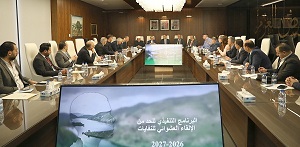Economy has potential to ride wave of change — PM

The Jordan Times
AMMAN — Prime Minister Omar Razzaz on Sunday expected that foreseen “global changes” would help Jordan shift from an economy relying on natural resources to one that mainly depends on innovation.
He cited the latest Global Competitiveness Report, which indicated that global economies that depend on innovation rank higher than those reliant on natural resources and traditional industries, the premier said.
The remarks came during Razzaz’ meeting with industrialists at the Jordan Chamber of Industry (JCI), the Jordan News Agency, Petra, reported.
He said that innovation-based economy has added value and reflects positively on GDP and on per capita income.
The premier noted that all indicators needed for the shift are available except macroeconomic stability, “and the government is working on that”.
He said that the Kingdom has realised remarkable achievements, as evident in education, infrastructure, innovation, and ICT indicators.
During the meeting, attended by Deputy Prime Minister and Minister of State Rajai Muasher and a number of Cabinet members, Razzaz said the global changes, including the Fourth Industrial (Technology) Revolution lessens the importance of super economies and allows more space for local economies.
He noted that in the context of this revolution, “small countries” can specialise, and compete globally, in specific fields of production.
Voicing optimism over the forecasted changes, Razzaz said shifting to an innovative economy requires national consensus over a comprehensive national awakening.
He stressed that the income and living standards of citizens cannot be improved without economic growth, which, in turn, cannot be achieved without focus on increasing exports.
“We have to look into dilemmas and challenges in our traditional and untraditional markets and we have to break, overcome obstacles, and open new ones”, the prime minister told his audience.
He pointed out that there are discussions on the Paris Protocol (to support Palestinians) to increase Jordanian exports to the Palestinian market, stressing that the agreement to simplify the rules of origin for Jordanian products bound for EU markets is, in its current version, below expectations and needs to be renegotiated.
Razzaz noted that a committee headed by Muasher has met with the JCI and discussed a matrix that includes priorities, responsibilities and timeframes.
He underscored the need for satellite committees to focus on the most job-generating sectors in their areas.
The Jordanian economy was growing from 2003 to 2008, he said, adding that such growth, however, did not create more jobs for Jordanians.
There is no country in the world that can justify a policy to employ non-citizens without a plan to replace them with domestic labour, the premier said.
Razzaz noted that after restoring security in Syria and Iraq, the border crossings will be reopened and the three countries will work on enhancing economic cooperation.
He highlighted the importance of establishing an “exportation house”, to work for improving chances for local exports, stressing that local industries depend, first and foremost, on convincing people of the quality of their products.
On the fight against graft, he said: “We are fed up with what we see and hear about corruption”, underscoring the “high level” of coordination among state agencies in this regard.
There is no immunity for corrupted people, the premier stressed, adding that, at the same time, dealing with corruption must take into consideration the need to avoid character assassination and to observe the rule that a suspect is innocent until proven guilty.
Energy and Mineral Resources Minister Hala Zawati said that the ministry is in contact with various bodies to meet the demands of the industrial sector.
Zawati said that the ministry supports any manufacturer that would use natural gas instead of fuel.
She also said the ministry is studying the reduction of the special tax below seven per cent or changing it into a sales tax.
For his part, Minister of Environment Nayef Fayez said that regulations related to green economy and the environmental standards have to be revised to increase the Kingdom’s exports and open new markets.
State Minister for Investment Affairs Muhannad Shehadeh said the ministry’s main focus is currently on supporting local investors, attracting foreign investments and cutting red tape.
Shehadeh said that the time needed to finish procedures related to investors has been reduced to 2.6 days at all relevant bodies.
Labour Minister Samir Murad said that his ministry’s priorities are a partnership with the industrial sector and the improvement of vocational training.
Latest News
-
 Syrian Army on Alert after SDF Armed Groups Detected East of Aleppo
Syrian Army on Alert after SDF Armed Groups Detected East of Aleppo
-
 Iran Says ‘Prepared for War’ as Alarm Grows over Protest Toll
Iran Says ‘Prepared for War’ as Alarm Grows over Protest Toll
-
 King attends launch of 2026-2029 government executive programme
King attends launch of 2026-2029 government executive programme
-
 Cold, stormy weather to prevail as low-pressure system brings heavy rain, strong winds
Cold, stormy weather to prevail as low-pressure system brings heavy rain, strong winds
-
 Gov’t launches national anti-littering programme for 2026–27
Gov’t launches national anti-littering programme for 2026–27